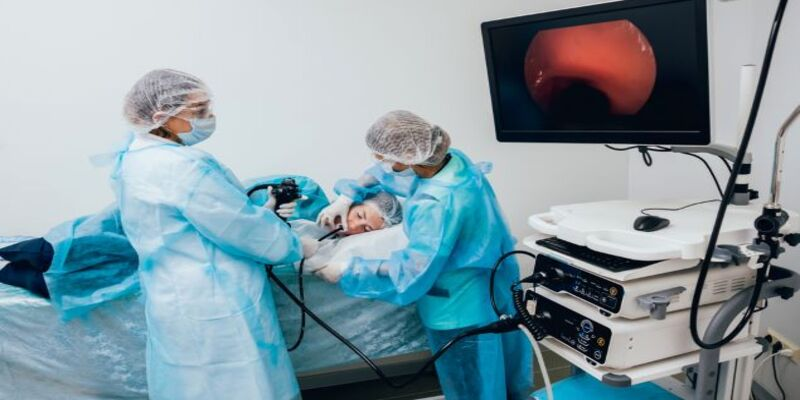The persistent and severe type of acid reflux is called gastroesophageal reflux disease (GERD). There are many variables and causes, but two of the most common are being overweight and pregnant. Most persons with symptoms can control them with dietary and pharmaceutical interventions. It is called acid reflux, when stomach acid flows back into the esophagus. Acid regurgitation or gastroesophageal reflux describes this phenomenon. Gastroesophageal reflux disease (GERD) is suspected when acid reflux occurs more than twice weekly (GERD). The NIDDK Trusted Source estimates that 20% of the U.S. population experiences symptoms of gastroesophageal reflux disease (GERD). Leaving some illnesses untreated could lead to serious complications later on.
Overview Of Gastroesophageal Reflux
When stomach acid flows back up into the esophagus and mouth, a condition known as gastroesophageal reflux develops. Even healthy newborns, toddlers, and adults may have occasional reflux, usually after a very heavy meal. Most attacks are transient and generate no serious symptoms or problems. On the other hand, those who suffer from GERD have chronic acid reflux that causes discomfort and sometimes permanent esophageal damage. Heartburn, regurgitation, and pain or discomfort while swallowing are all potential symptoms of gastroesophageal reflux disease.
What Occurs With Reflux And Gerd?

The esophagus is a muscular tube connecting the mouth and stomach that is roughly 10 inches long as well as 1 inch in thickness in adults. The process by which food is transported from the esophagus to the stomach, known as peristalsis, involves a wavelike motion. The term "lower esophageal sphincter" is used to describe the muscular ring located at the base of the esophagus, just above where it connects to the stomach (LES). After swallowing, the lower esophageal (LES) relaxes to allow food to enter the stomach, where it is digested by stomach acids. If the LES is functioning properly, food and gastric juice won't back up into the esophagus during swallowing.
Gerd Risk Factors
The following factors increase the likelihood of a person acquiring GERD:
- A hiatus hernia occurs when the upper stomach protrudes through the diaphragm. There is a hole throughout the diaphragm (the "diaphragmatic hiatus") through which the esophagus travels before it connects with the stomach; in persons with a hiatal hernia, a portion of the stomach protrudes through this gap.
- Obesity - Overweight and obese people are at a higher risk of developing GERD. Although the exact cause is unknown, high intra-abdominal pressure may play a role.
- Numerous pregnant women suffer from heartburn and indigestion. Complications from this are quite unusual and often go away after birth.
- Some foods (such as fatty meals, chocolate, as well as peppermint), caffeine, alcohol, as well as cigarette smoking may all contribute to acid reflux and GERD. Also, some drugs may significantly raise your risk.
Gerd Symptoms
If you suffer from GERD, you may experience the following symptoms:
- Heartburn causes a painful, scalding feeling in the middle of the chest, which may go up the esophagus. Typically, this occurs after eating.
- Regurgitation occurs when stomach contents (acid combined with undigested food particles) are brought back into the mouth or throat.
Furthermore, GERD may cause these other symptoms:
- Abdominal distress (pain in the upper abdomen)
- Pressure in the chest
- Pain or discomfort during swallowing (dysphagia) occurs when food lodges in the esophagus.
- Recurring episodes of sore throat or hoarseness.
- Throat pain or cough that won't go away
- The feeling of heaviness in one's chest
- The onset of nausea and vomiting
Gerd Diagnosis

Your symptoms and other risk factors are used to diagnose GERD. A health care professional may diagnose GERD based on your symptoms alone if you exhibit the "classic" symptoms of illness, which include heartburn and regurgitation. They may recommend trying medication in this case; if your symptoms improve, GERD is likely to blame.
Your doctor may suggest further testing if:
- Take a proton pump inhibitor and get no relief from your symptoms (PPI)
- If you don't experience the typical GERD symptoms, it's possible that you don't have GERD.
- Have signs that might point to a more severe condition.
- Barrett's esophagus and other difficulties you may face due to your risk factors
Conclusion
Here are four methods for dealing with gastroesophageal reflux disease (GERD), including medicine and surgery. It is common for people to improve with a mix of lifestyle adjustments and medicine. There are certain people for whom surgical intervention won't provide enough relief to warrant trying anything else first. Some people would rather have surgery than take medicine for the rest of their lives.

An Overview of Heart Failure
Oct 27, 2023

How to cope with the stress of social isolation: A Complete Guide
Oct 15, 2024

What Is a Meniscal Cyst
Dec 13, 2023

What Are Some Facts Concerning Postpartum Depression?
Dec 14, 2023

It Would Be Best If You Kept In Mind Menopause Causes A Jump In Cholesterol
Nov 02, 2023

Why You Shouldn't Drink "Healthy Coke" If You Care About Your Teeth or Stomach
Feb 08, 2024

Supplementing Your Diet with Cholesterol-Lowering Foods
Feb 04, 2024

How Long Does The Flu Shot Take To Start Working?
Jan 30, 2024



